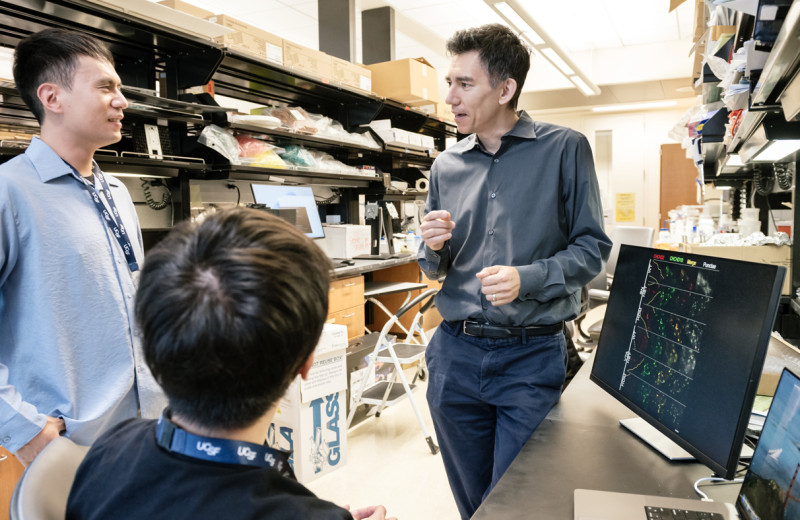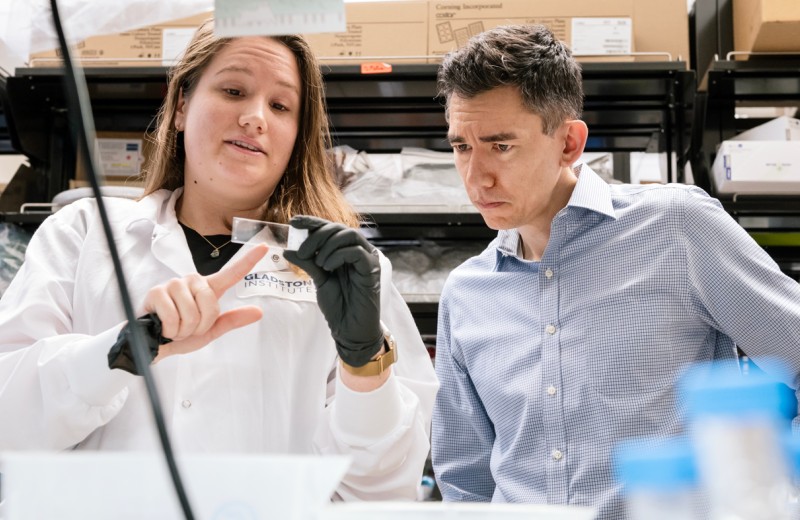Gladstone NOW: The Campaign Join Us on the Journey✕

Ken Nakamura, MD, PhD, was honored by the American Academy of Neurology for his research on how mitochondria contribute to Parkinson’s disease. [Photo: Chris Goodfellow, Gladstone Institutes]
Ken Nakamura, MD, PhD, an assistant investigator at the Gladstone Institutes, received the 2015 Jon Stolk Award in Movement Disorders for Young Investigators from the American Academy of Neurology. This prestigious award recognizes young investigators who have made significant contributions to research in movement disorders. Nakamura received this award for his remarkable work on how changes in mitochondria—the power sources in cells—contribute to Parkinson’s disease.
“My laboratory investigates the biological underpinnings of mitochondrial dysfunction and energy loss in neurons and how this loss contributes to Parkinson’s disease and other neurodegenerative disorders,” said Nakamura. “Our hope is that, with this knowledge, we can develop new therapeutic approaches to target cellular energy deficits in Parkinson’s disease.”
As a postdoctoral fellow with Robert Edwards, MD, at the University of California, San Francisco (UCSF), Nakamura showed that the brain protein α-synuclein binds to mitochondria and causes them to fragment, revealing a potential mechanism by which α-synuclein may cause neurodegeneration. Since joining Gladstone, Nakamura’s laboratory established the first definitive connection between mitochondria, energy failure, and neuronal dysfunction in an animal model of neurodegeneration. This discovery stemmed from a novel series of tests, developed by Nakamura’s laboratory, that measure energy levels in cells. His lab also studies how problems in mitochondrial fission, the process by which mitochondria divide, contribute to Parkinson’s disease. This work is based on his previous research showing that a specific type of neuron that dies in Parkinson’s disease is more vulnerable to problems in mitochondrial fission.
“This award is a great honor for Ken and the Gladstone Institutes,” said Lennart Mucke, MD, director of the Gladstone Institute of Neurological Disease. “Through their research, Ken and his group have advanced our understanding of how impairments of mitochondria and cellular energy in metabolism contribute to Parkinson’s disease. It is likely that their achievements will lead to the development of better treatments for this challenging condition.”
The Stolk Award is named for Jon Stolk, who was a driving force in the drug-development field for Parkinson’s disease. As a recipient of this award, Nakamura will be recognized at the 68th American Academy of Neurology Annual Meeting in Vancouver, Canada.
In addition to directing his research program at Gladstone, Nakamura sees patients at the Parkinson’s Disease and Movement Disorders Clinic at the UCSF, where he is an assistant professor. He has received several other awards, including a Burroughs Wellcome Fund Career Award for Medical Scientists and the University of Chicago’s Steven Lukes Memorial Prize for excellence in the fields of internal medicine and neurology.
Featured Experts
Want to Join the Team?
Our people are our most important asset. We offer a wide array of career opportunities both in our administrative offices and in our labs.
Explore CareersEvidence Builds for Disrupted Mitochondria as Cause of Parkinson’s
Evidence Builds for Disrupted Mitochondria as Cause of Parkinson’s
A new study from Gladstone Institutes strengthens the links between energy breakdown in cells and the onset of Parkinson’s, potentially illuminating new paths for treatment.
News Release Research (Publication) Parkinson’s Disease Neurological Disease Nakamura LabOverworked Brain Cells May Burn Out in Parkinson’s Disease
Overworked Brain Cells May Burn Out in Parkinson’s Disease
A discovery about the consequence of neuron overactivity could lead to new methods of treating or preventing Parkinson’s disease.
News Release Research (Publication) Parkinson’s Disease Neurological Disease Nakamura LabInside the Brain: Tackling Neurological Disease at Its Roots
Inside the Brain: Tackling Neurological Disease at Its Roots
For World Brain Day, discover some of Gladstone’s latest breakthroughs in neurological research.
Gladstone Experts Research (Publication) Alzheimer’s Disease COVID-19 Parkinson’s Disease Neurological Disease Akassoglou Lab Corces Lab Huang Lab Mucke Lab




